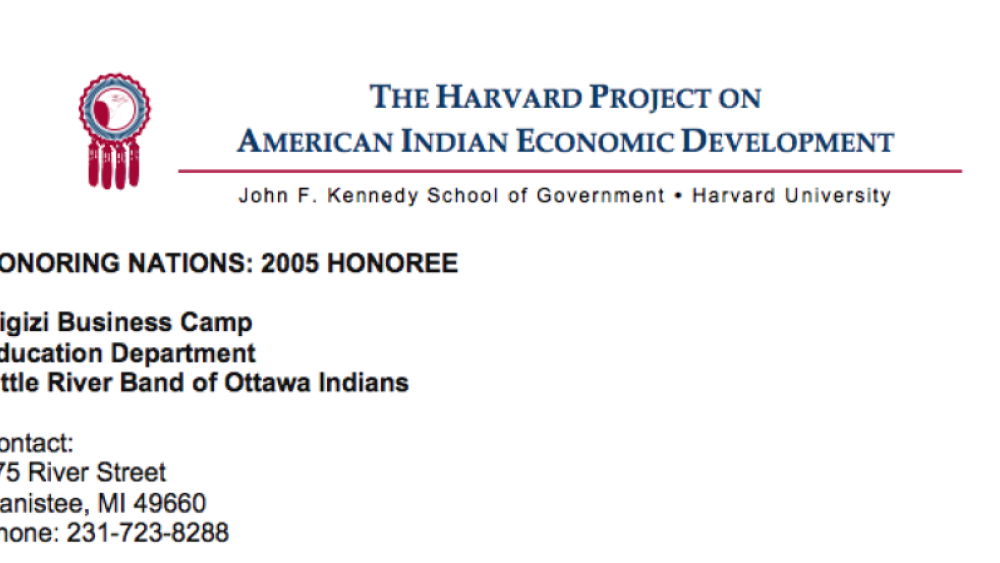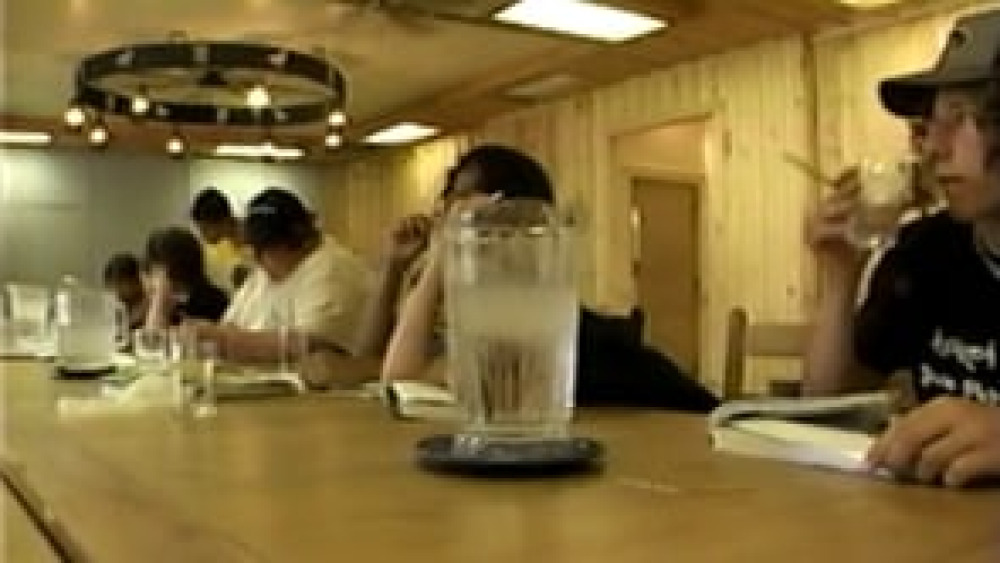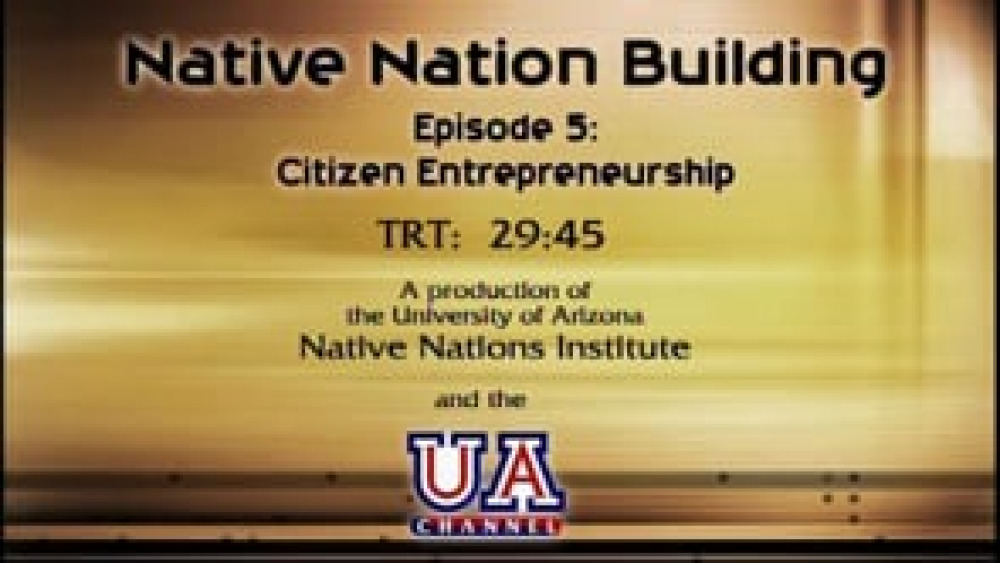Lee Sprague (Little River Band of Ottawa Indians) presents an overview of the Migizi Business Camp to the Honoring Nations Board of Governors in conjunction with the 2005 Honoring Nations Awards.
Additional Information
Sprague, Lee. "Migizi Business Camp." Honoring Nations Awards event. Harvard Project on American Indian Economic Development, John F. Kennedy School of Government, Harvard University. Tulsa, Oklahoma. November 1, 2005. Presentation.
Transcript
Lee Sprague:
"[Native language]. My name is Lee Sprague. I'm the [Native language] for the Little River Band of Ottawa Indians and we're deeply honored to be here before you today and I want to thank the board for being one of the finalists. And I want to thank everyone in the audience for honoring all the program finalists by your presence here today.
One of the things that's been very important -- we've been fractured as a community for over 150 years. The federal government said that we were not a nation of people. In 1994, we got positive affirmation by the U.S. Congress that they reaffirmed that relationship. And so we've been left with the task of developing our whole tribal nation as a community almost from scratch. In many ways, there were strong elements of our community that existed but one of the things that our tribal council and our elders knew that was important was the investment in our tribal youth, because they're the ones that have probably suffered the most in terms of being in a world that was new to them in terms of this new relationship with the federal government, but having also being the end-recipients of this long fractured relationship and the fracturing of our nation. And in bringing us back together, we knew it was critically important that we focus on our tribal youth and on economic skills, because that's the fluency that we know that we needed to have in addition to our cultural fluency, our language; that the economic fluency that our young children needed to have to be a part of that growing of our nation, the strength of our nation was critical. And the tribal council has been very generous with their support in funding this program. And we have a tribal council member here, Norbert Kelsey, and also one of our tribal elders, Marge Lutz, right back here taking photographs for us. So without their continued support and understanding of the things that we needed to do, it would be very hard to be here today before you. We've had...basically the Migizi Business Camp is teaching entrepreneurial skills to our youth and when I realize what I know that they know now and what I didn't know until I was into my late 20s, it's amazing. And that's how I know as leaders that we're doing something positive when our children know about stuff that we didn't know until we were older. And so each one of these young people up here is fluent in entrepreneurial language, and they are going to be the future leaders, not only of our nation but of our part of the world in the Great Lakes. And I'm looking forward to that day, because I will know that the hard work the council and elders and I've put into this and just being supportive and planting that seed. And in planting that seed there's three critical people that were essential to making this program highly effective. We have Yvonne Parson, who is our Education Program Coordinator, Yvonne. We also have Bridgette Cole who's our Education and Youth Services Director. And Florence Stickney, who is the faculty for the Business School at San Francisco State University and also the Director for the Center for Small Business, and who I first started my own self, I was in my 30s, learning the skills that these young kids know now, at San Francisco State, not that long ago, so I know what she's capable of. So with that we have a small video we'd like to share with you just to give you a taste of what we're talking about..."
"...I just have one more comment to state about just my own personal satisfaction is that I grew up as a...I used to be a little Indian kid a long time ago and I'm a small businessman or a tall businessman, but to see...the most impressive thing to me was to see these kids, maybe the first day of camp a little slow, second day they're getting with it but by the third day every single one of them is self-motivated to move forward with their business projects. And to see a group of young Indian people have an internal motivation to excel and keeping us awake late at nighttime because they want the information and they're asking us the kind of tough questions that we have to get the answers to or at least work with them so they can find the answers themselves. That's been the most satisfying, is to see these young kids develop that internal motivation and move forward, and it's something I didn't see a lot as a young kid growing up, something I'm very proud of being able to achieve with this Migizi Business Camp. Thanks."
Amy Besaw:
"Questions from the board?"
Brian C. McK. Henderson:
"Can I please get an invitation to go to camp? I would..."
Lee Sprague:
"You're invited next year. We're always bringing in outside experts from business fields."
Brian C. McK. Henderson:
"Okay. I wish I had had that opportunity, but financial and economic literacy, business literacy is very important and it's one of those things that is really lacking across Indian Country, so congratulations on the effort. And if I may, I'm going to break a little bit probably with our time constraint, Amy, if you allow me. I'm really curious to hear from each of the students, each of the youngsters up there who are very courageous and have done a tremendous job and have traveled a long way maybe to just give us a sense of what, after you've had this experience what do you want to do, what do you see next as, just a very brief statement of your own interest, what sparked your interest in the camp, and what do you want to each look forward to doing in the future?"
Raquel Cole:
"Hi, I'm Raquel Cole. Well, like camp, it helps me with a lot of things like I said in the video. It helps me with classes. In math class there's certain things you can do better. I did forensics which is public speaking this year and the camp, like I did sales, and doing the sales in the camp, it helped me out a lot because I had to write a whole speech and I had to memorize it and it was kind of, made you nervous but I kind of had more of a sense of what I was looking for to do, like what people and judges would look for. And I did fairly well in forensics and it helped me out a lot."
Buddy:
"Good morning. My name is Buddy...The past business camps I've been to for the past three years helped me out a lot in school. I have an Introduction to Business class this year and the program has helped me a lot in school with the programs like we did for the past three years have helped me in school with my schoolwork and just every day life watching people do their businesses and what I've learned. It just helped me out a lot and I plan to go on with this business career and school and just business helped me out a lot. That's something I actually do, so the program has been great. And that's all, thank you."
Amber Shepherd:
"My name is Amber Shepherd and I think the business camp is really helpful because it really advances you because when you go to college you know a lot more than most other people and you get a glimpse at what you might want to do, if you want to be your own business owner or work for another employer. And since I've been to business camp I think I want to start my own business and now I know more of what I need to do and how to start it. Thanks."
Brett:
"I'm Brett and this was my second year and I'm looking forward to go for a third one. It's hard, but it's fun."
Lee Sprague:
"One of the most fascinating parts we get to observe is when the kids start this process they start sort of negotiating with each other, partnerships are formed, corporations are formed, single business people might do business with another, and we try and stay out of that because they'll figure it out, and so just to watch them go through that process alone understanding that you need other people and the negotiating skills that we play where they're each given a bag of items and they have to negotiate prices and not just monetary prices. So that human interaction which really business is, it's so neat to watch that play out. And one of the things that they're not telling you is that they are...the kids that have been through this program, it's nice to see that some of the kids that have been two and three years now really working with the younger ones there. They're almost stepping into the role of being the teachers and it's almost self-perpetuating on its own terms at that point. And I really...we're looking at some future leaders here in the business world."
JoAnn Chase:
"I have one additional question. First of all, congratulations on a really fantastic program and I was excited in reading about your program that there are some discussions underway now of expanding the program to at least initially some of the other Great Lakes area tribes, and I was wondering if you might just comment or update us a bit if you've moved forward, if the plans have been formalized in any way or where you might be in terms of providing some services to other tribal communities and areas."
Lee Sprague:
"Well, our kids of course live and go to school with other kids from other tribes in the area and some people are aware of this and we've been looking at this, a way of doing this, and this actually goes back to Florence who had actually done this program as a stand-alone in Haskell and Browning, Montana, and up in Alaska and I was involved on a very small part at that point. So I knew that, what the potential this had, and that with the support of our tribal council at Little River Band we were able to find a home for it and to kind of tweak it over the years. We'd actually like to expand it. We're looking at maybe taking it on the road. We're looking for a permanent facility possibly and we have some negotiations going on with an old Forest Service nursery campsite that might serve as a good location for an ongoing camp two or three different sessions. And actually we'd need to get some adults in there, too, because I tell you these guys can run circles around me as a 35-year-old and probably me as a person here real, real quick. So we want to look at ways that we can fine-tune this program with other tribes. We've included a language component in the past in our program, we've included cultural components and we think that we can work with another tribe in putting together those kinds of elements and then bringing in not only their local tribal leaders, but also local business leaders in that community. The judges in our...at our business plan competition are the local bankers, the local service corps of retired executives, the local Chamber of Commerce people, the Junior Achievement people. They're the ones that come in and evaluate these plans and so we think that by bringing those elements together in another community and working with that local community to...'Here's what you need to do basically. Here's how we did it at Little River Band and here's how you can do it at your place.' Put it into kind of like a booklet to that extent and bring all those elements together and it really does foster positive relationships between the tribe and the local communities we think, knowing that we have the same interest and are going to be successful in business opportunities."



